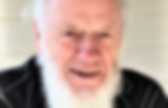

Considering the Complexity of Human Beings: The Case of Woodrow Wilson. So, what do you think about the presidential election of ’16?
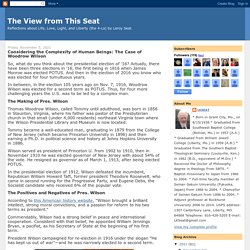
Actually, there have been three elections in ’16, the first being in 1816 when James Monroe was elected POTUS. And then in the election of 2016 you know who was elected for four tumultuous years. In between, in the election 105 years ago on Nov. 7, 1916, Woodrow Wilson was elected for a second term as POTUS. Thus, for four more challenging years the U.S. was to be led by a complex man. The Making of Pres. Thomas Woodrow Wilson, called Tommy until adulthood, was born in 1856 in Staunton, Virginia, where his father was pastor of the Presbyterian church in that small (under 4,000 residents) northeast Virginia town where the Wilson Presidential Library and Museum is now located. Tommy became a well-educated man, graduating in 1879 from the College of New Jersey (which became Princeton University in 1896) and then earning a Ph.D. in political science and history at Johns Hopkins University in 1886.
Hopeful, But Not Optimistic. A good friend recently wrote, “My usual optimism is fading.”
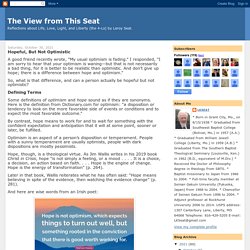
I responded, “I am sorry to hear that your optimism is waning—but that is not necessarily a bad thing, for it is better to be realistic than optimistic. And don’t give up hope; there is a difference between hope and optimism.” So, what is that difference, and can a person actually be hopeful but not optimistic? Defining Terms Some definitions of optimism and hope sound as if they are synonyms.
By contrast, hope means to work for and to wait for something with the confident expectation and anticipation that it will at some point, sooner or later, be fulfilled. Optimism is an aspect of a person’s disposition or temperament. Fifty Faithful and Fruitful Years: Jim Wallis and Sojourners. During the academic year of 1971-72, my family and I came back for a year in the States after living in Japan for five years.
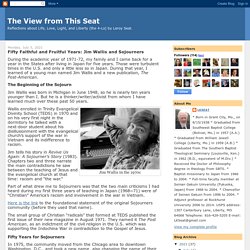
Those were turbulent times in the U.S. and only a little less so in Japan. During that year, I learned of a young man named Jim Wallis and a new publication, The Post-American. The Beginning of the Sojourn Jim Wallis was born in Michigan in June 1948, so he is nearly ten years younger than I. But he is a thinker/writer/activist from whom I have learned much over these past 50 years.
The Problem of (Teaching) History: “1619” or “1776”? This post is closely related to my June 19 article regarding critical race theory (CRT).
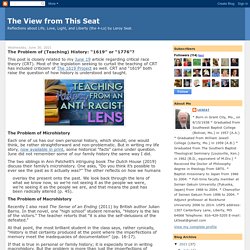
Most of the legislation seeking to curtail the teaching of CRT has included criticism of The 1619 Project as well. CRT and “1619” both raise the question of how history is understood and taught. A Combative and Compassionate “Lily”: The Life of Yuri Kochiyama. Rarely am I moved to tears while watching a movie, but recently seeing Come See the Paradise (1990) brought tears to my eyes, especially when the Kawamura family, including their lovely daughter Lily (who was married to an Irish American), was sent to an internment camp.
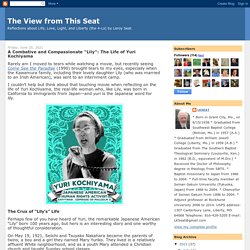
I couldn’t help but think about that touching movie when reflecting on the life of Yuri Kochiyama, the real-life woman who, like Lily, was born in California to immigrants from Japan—and yuri is the Japanese word for lily. The Crux of “Lily’s” Life. Criticizing Criticism of Critical Race Theory. So, What about the Blind Men and the Elephant? Last month I posted “Pondering Pachyderm Perambulation,” relating to the book Circling the Elephant (2020) by John J.
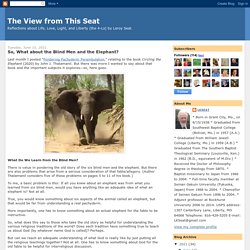
Thatamanil. But there was more I wanted to say about that book and the important subjects it explores—so, here goes. What Do We Learn from the Blind Men? There is value in pondering the old story of the six blind men and the elephant. But there are also problems that arise from a serious consideration of that fable/allegory. Thank God for Uncle Tom(s)! It is probably apocryphal, but the story is told that when Pres.
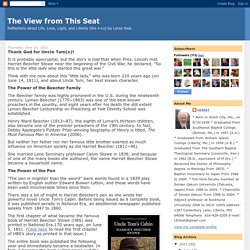
Lincoln met Harriet Beecher Stowe near the beginning of the Civil War, he declared, “So this is the little lady who started this great war.” Think with me now about this “little lady,” who was born 210 years ago (on June 14, 1811), and about Uncle Tom, her best known character. The Power of the Beecher Family. Pondering Pachyderm Perambulation. You will soon learn as you read this blog post about an old story, a new book, and the ongoing issue why I have used such an enticing (and puzzling?)
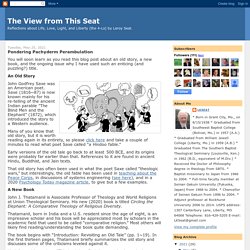
Title. An Old Story. Rep. Liz Cheney: Speaking Truth to Power. My May 15 blog post was about columnist Michael Gerson, whom I called a man of integrity.
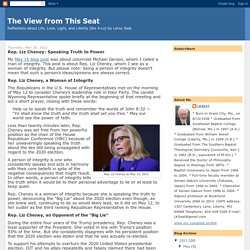
This post is about Rep. Liz Cheney, whom I see as a woman of integrity. Michael Gerson: An Evangelical with Integrity. Today (May 15) is the 57th birthday of Michael Gerson, the well-known columnist for The Washington Post.
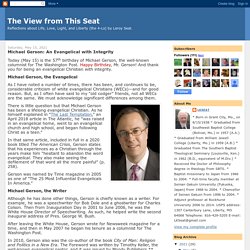
Happy Birthday, Mr. Gerson! Across the Pacific, and Asia, with Love. May 2006 was a special time for my wife June and me. We made our first visit back to Japan, where we had lived from 1966 to 2004. One of the many special events that month was the release of a new book planned and published by Japanese friends in our honor. It was a wonderful tribute. Across the Pacific with Love Kimura Koichi was a former seminary student of mine and my successor as pastor of Fukuoka International Church. Fourteen Japanese colleagues, former students, friends, and scholarly acquaintances wrote essays for the book.
Murasaka-sensei’s essay was titled “A Man Who Crossed the Pacific Ocean with Love.” In addition to Kimura-sensei, two of my good friends served as co-editors: Yamanaka Sakiyo, a professor at Seinan Gakuin University with whom I had worked closely in the Department of Religious Activities, and Kanamaru Eiko, one of my outstanding former students. The book was completely bilingual. Across Asia with Love In May 2016, June and I made our last trip to Japan. Is E Pluribus Unum Viable Now? In 1776, two centuries and 45 years ago, John Adams, Benjamin Franklin, and Thomas Jefferson proposed a Great Seal for the United States.
The only words on the proposed seal were E PLURIBUS UNUM, a Latin phrase meaning “one from many.” Viable for the United States? According to the E Pluribus Unum Project of Assumption College (now University), e pluribus unum “offered a strong statement of the American determination to form a single nation from a collection of states.” Should Washington, D.C., Be a State? Last week, the U.S. House of Representatives passed H.R. 51, the bill which would make a new state out of most of Washington, D.C. Even prior to that vote, there were people proposing the following design for a new flag with 51 stars: Finally Projected “Taxation and Representation” was the title of a blog article I posted back in June 2016. It was partly about Washington, D.C., where, I wrote, “there is taxation but no representation on the federal level.” The Beautiful Concept of Ubuntu. For decades I have greatly admired the life and work of Archbishop Desmond Tutu, but the only blog post I have made primarily about him was seven years ago on April 30, 2014 (see here).
It was from him that I first learned about ubuntu, a beautiful word/concept. The Meaning of Ubuntu. Jane, Good for All the Earth. An Apology for Apologetics. Tyranny of the Majority or Tyranny of the Minority? The Shameful Easter Massacre of 1873. Remembering Great-Grandmother. This blog post is about two great-grandmothers: Rachel Seat, my great-grandmother who was scarcely known beyond the county where she lived most of her life, and writer Michelle Duster’s great-grandmother, the world-famous Ida B. Wells. My Great-Grandmother: Rachel Clark Seat Although I have claimed to faintly remember Great-grandmother Rachel, I may remember mainly the picture of me sitting on her lap in 1941 (see picture on right) and what my parents told me about her.
Rachel Clark was born in Perry County, Illinois, in 1852 and in her tenth year migrated with her birth family to Worth County, Missouri, where I was born 76 years later. Great-grandmother Rachel married William Littleton Seat in November 1870, the month after her 18th birthday. Rachel was a widow for over sixty years, dying in the summer of 1941.
Michelle Duster’s Great-Grandmother: Ida B. Michelle Duster was born 101 years after her great-grandmother, Ida B. Early this year, Ms. The Life and Legacy of Ida B. Death Control for Alzheimer’s/Dementia Patients? Does Equality Vitiate Religious Freedom? The U.S. Democrats want equality. The Republicans oppose equality because they want to protect religious freedom. But does equality vitiate (= destroy or invalidate) religious freedom? Or does/should religious freedom vitiate equality? Those are questions now confronting the polarized U.S. The House-Passed Equality Act On February 25, the U.S. Prior to the House vote, on Feb. 19 Pres. Leaders from groups like the ACLU and Human Rights Campaign argue that the Equality Act ensures that gay and transgender Americans are no longer fired, kicked out of their housing, or otherwise discriminated against due to their sexuality or gender identity.
So, What about Death Control? Understanding One Thing is to Understand Everything. Thinking about Death. The Gospel in Dostoyevsky. In Fond Memory of Mrs. King. Hopes for the Biden Presidency. Hawley with Blood on His Hands. In Admiration of Beethoven and His Ninth Symphony. The Bruderhof: Celebrating a Century of Christian Discipleship. Learning from the Indomitable Mother Jones. In Memory of Leo Tolstoy. Life: A Brief Candle or a Splendid Torch? What To Do about a White Jesus? Junípero Serra: A Sorry Saint. Re-escalating the Abortion Wars. Whatever Became of Sin? Holy Troublemakers. De-escalating the Abortion Wars. Votes for Women: The Battle of August 1920. “The Fifth Evangelist”: In Appreciation of J.S. Bach. "Deus Aderit": Learning from Carl Jung. Women in the Church. Is it Bad to be “Woke”? The Admirable Bryan Stevenson, Esq. Thank God for Nurses! The Search for Meaning in Terrible Times.
Remembering Fanny Crosby, Queen of Gospel Song Writers. The Deplorable Doctrine of Discovery. Christianism: What It Is and Why It’s Objectionable. In Honor of Susan B. Anthony, Persistent Agitator. The Subversive Act of Baptism. The Sand Creek Massacre, a National Disgrace. Climate Crisis: The Challenge of the Decade. A Remarkable Man, a Remarkable Church: Howard Thurman and Fellowship Church.
Embarrassed to be a Christian? An Asian Theologian Worth Knowing. “The Family” is Frightening. My Favorite Farmer. What about Native Americans? The Wonderful Concept of Kintsugi. Do Preachers Promise Too Much? The Universal Christ. Biblical, but not Christian. The View from This Seat: Are Sinners Really in the Hands of a Loving God? The View from This Seat: What about Penal Substitutionary Atonement?
The View from This Seat: Growing in the Faith. The View from This Seat: Should Stone Mountain be Defaced? The View from This Seat: The Rebirth of the KKK.